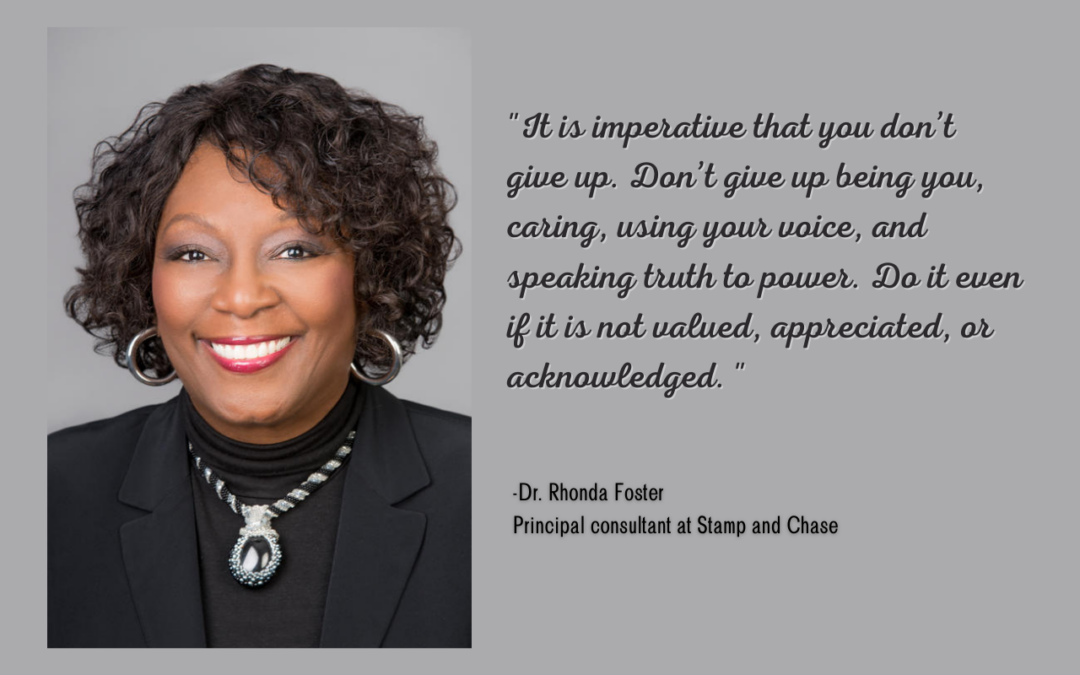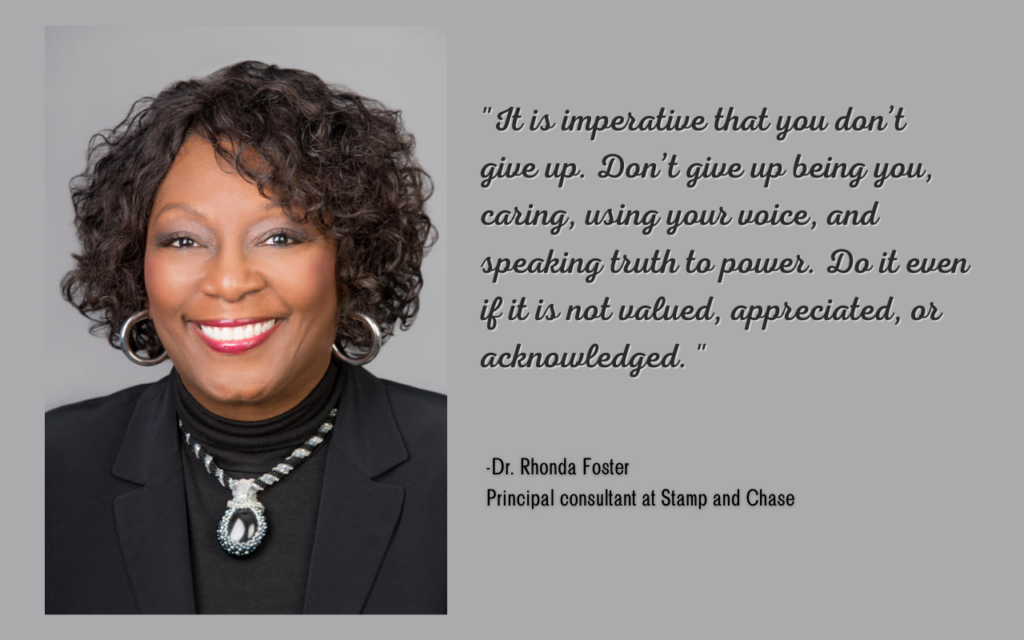Rhonda R. Foster, EdD, MPH, MS, RN, is the principal consultant at Stamp and Chase. Dr. Foster is a published and highly sought-after healthcare consultant and coach with a penchant for driving change, quality, and organizational improvement.
Dr. Foster’s consultation experience has allowed her to provide expertise in the U.S. in community hospitals, academic medical centers, and healthcare systems and hospitals in Brazil, Abu Dhabi, and Qatar. She describes herself as a committed, funny, and driven thinker. Her purpose is to make a difference in organizations and leave a legacy through the development and coaching of others.
Some know Dr. Foster as an executive coach, others as a consultant and teacher, but also as an executive leader and thought partner. She performs roles for the American Nurses Association, David Couper Consulting Inc., Stamp and Chase Consulting Firm, and as an independent consultant for her company, the Grace Consulting Group.
Dr. Foster is an important nursing leader, and we’re pleased to profile her as we celebrate Black History Month with the Black Nursing Leaders Series 2023.
In February, we’ll highlight healthcare leaders who are prominent figures in their organizations and are making transformational impacts in nursing.
Meet Dr. Rhonda Foster, the principal consultant at Stamp and Chase
Talk about your career path and how you ascended to that role.
My career started with my graduating from an associate degree program in nursing. I returned to school immediately because it was clear that I would need a bachelor’s degree in nursing to have more options. It took five years part-time to complete this program. I accepted my first management position in an ambulatory environment and was able to influence this level.
My leadership goal was always to advocate and influence decisions that affected nurses. I realized that the more I advanced and became educated, the more influence I could have in the healthcare environment. I completed a master of science in nursing administration degree from Georgetown University. My leadership trajectory was from manager to director to assistant vice president. My position was eliminated due to the consolidation of services, and I had a decision to make. Either return to school or pursue another leadership position. I chose to go to school.
I was admitted to the doctorate program in leadership studies at Bowling Green State University. This interdisciplinary program changed my perspective on my role and responsibility within healthcare. My focus shifted and became broader. I was an advocate and voice for staff and patients, and families. In so doing, I had to be fiscally responsible, competent, articulate and speak truth to power. While attending Bowling Green, I completed a master’s degree in public health administration. This degree stretched me even more to look beyond the hospital’s walls into the community and consider the social determinants of patients’ health. Equipped with this education and experience, I was ready for my first chief nursing officer position.
This position, my colleagues, and the patient population we served were incredible. My leadership philosophy was honed, and my professional growth was encouraged. I’ve held several other CNO positions in my career, but none were so instrumental in my growth and development. Mentors and advocates are critical to success. My career as a consultant evolved from mentorship. My career as an executive coach evolved out of mentorship. My career opportunities to write, speak at conferences, travel internationally, consult, and use my voice came from people inside and outside of healthcare encouraging me, offering opportunities, and seeing me for the person and professional that I am despite the color of my skin.
What inspired you to become a nurse?
My high school counselor helped me to make the decision. I wanted to work within the healthcare setting and wanted options. Nursing afforded me both.
What are the most important attributes of today’s nursing leaders?
The competencies required to lead have stayed the same. However, the value of specific competencies and attributes has changed. The most important attributes now are curiosity and courage. The environment is changing dramatically, and if leaders are not curious about possibilities and ask “what, how, and why” questions, they will limit themselves to what they already know. Unfortunately, that knowledge is dated. Courage is needed to change, test ideas, be wrong, be authentic, and be relevant.
What does it mean to you to be a nursing leader, and how are you making a difference?
Being a nurse leader to me means being a thought partner, using my voice to advocate and be provocative to stimulate others to think, and it means that I have a responsibility to grow daily.
What is the most significant challenge facing nursing today?
It is a fixed mindset about change, diversity and inclusion, and the community’s needs. We get in our way and move painfully slow. The pandemic reminded us that we could be radical, open-minded, and move at lightning speed. We can’t put those skills back on a shelf. We must be open to other points of view, other ideas, and methods to achieve excellence in patient care.
As a nursing leader, how are you working to overcome this challenge?
My circle is huge. I surround myself with diverse leaders from various disciplines and don’t believe I have to have all the answers. My mindset allows me to challenge myself first.
What nursing leader inspires you the most?
The leadership, work, and contemporary thinking of Dr. Maria O’Rourke inspire me. She is wise and yet a life-long learner. She is well-connected in the industry, which makes her an excellent resource. She doesn’t mind sharing the ups and downs of her career, and she is still mentoring nurses. She is an ideal role model and leader.
What inspirational message would you like to share with the next generation of nurses?
A message of hope. It is imperative that you don’t give up. Don’t give up being you, caring, using your voice, and speaking truth to power. Do it even if it is not valued, appreciated, or acknowledged.
Is there anything else you’d like to share?
A favorite quote I value: “Before you are a leader, success is all about growing yourself. When you become a leader, success is all about growing others.” —Jack Welch
- Meet a Champion of Nursing Diversity: Kendra Coles - April 3, 2024
- Meet a Champion of Nursing Diversity: Barbara Bosah - March 13, 2024
- Tune Into New Podcast Series: Conversations About Health Care Delivery in the United States - March 7, 2024




